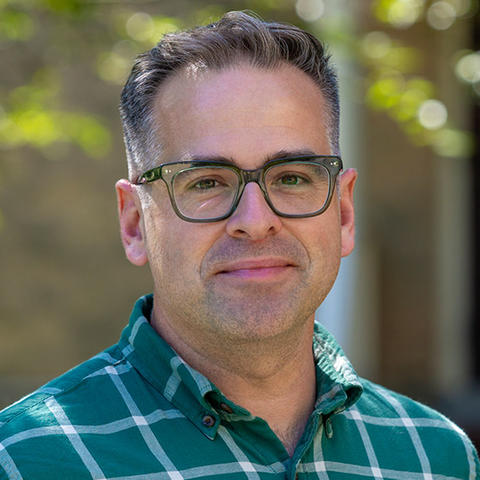A Poem for What Ails You

Photo by Patrick Montero.
Details
Professor Joshua Moses' Poetry Clinic offers poems to those with questions about romance, parenting, illness, death, and more.
Joshua Moses is a professor of anthropology and environmental studies, but he’s always had an affinity for poetry. When he met a like-minded scholar in his post-doc program at McGill University, a bond was forged. For more than a decade, Moses and McGill University neuroscientist Suparna Choudhury have corresponded using poetry. Through the pandemic, illnesses, and life’s more typical ups and downs, they would email and text poems, or passages from poems, that seem appropriate or uplifting.
Then about five years ago Choudhury suggested to Moses that they share their exchanges with a larger audience. Her thinking was, “We do this for one another and it gives us so much solace, why not make this a wider offering for our friends or the public, so that people can get a vicarious experience from exchanges of poetry?”
They did even better: After securing funding and hiring a web designer, they launched Poetry Clinic, an online advice column. Each month, a poet-in-residence responds to four or five reader letters with what the site calls “a poetic tonic.” Topics include romance, parenting, illness, death, and how to stay grounded or keep hold of positive feelings. The responses begin with general thoughts and counsel, followed by poems and passages relevant to the issue.
“There’s something about the letter-writing form that feels intimate and close, but also amenable to wider audiences,” Choudhury says.
The site is also a way for Moses and Choudhury to engage poets and artists in the daily lives of people. “Poetry gets made fun of a lot—that it’s pretentious or just for particular kinds of people,” Moses says. “But the way I think about it is, everyone has the capacity to use poetry to engage in the world differently. In a small way, Poetry Clinic brings poetry into our daily lives, to help us understand the world and use our imagination.”
At a time when many people feel isolated, scared, and anxious about the world—feelings that students have expressed in the classroom—the site offers solace, ideas, and encouragement. “I think the arts have an important and often forgotten role in people’s well-being, especially at the present moment. With climate catastrophe and economic precarity, people don’t know where to turn,” Choudhury says. “Poetry offers a sense of solidarity, it connects people, and the open-endedness gives form to complex and overwhelming emotions.”
Moses and Choudhury have sponsored in-person events to further engage the public, including a collaboration in Montreal with McGill’s Critical Media Lab. Last September, at Haverford’s Hurford Center for the Humanities, Choudhury spoke about “Ecology, Arts, and Survival” at the (Re)growing a Living Culture series. More Poetry Clinic events are planned at Haverford and in Philadelphia this coming year.
“There are certain lines or phrases in poetry that are a reminder that people are much bigger and full of possibilities than they think they are, and that we live in a world that tells us otherwise,” says Moses. “Poetry’s a more fundamental way of showing us how mysterious and insane and beautiful the world is at once, and that in the end, poetry is a necessity, as many poets have pointed out.”
View Poetry Clinic letters at poetryclinic.org.
—Anne Stein




